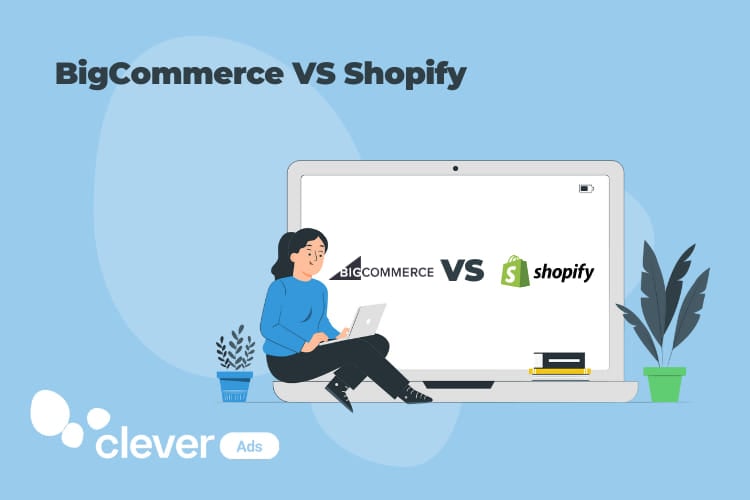BigCommerce vs Shopify: which one is the best for you?
Online shopping is the biggest trend right now, and it is the kind that is here to stay in the years to come. Now that you’ve decided to start an online business, deciding which platform to build your store on is crucial to your success. If you are a solopreneur trying to bootstrap your first eCommerce business, you will find pre-built eCommerce platforms to be more appealing than having to build a brand new online store from scratch. In this article, we will compare the advantages and disadvantages of choosing BigCommerce vs Shopify, two of the leading online store building websites in the eCommerce market today.
Websites are essential to all businesses, but it is not easy building one. All the more is true if you want to integrate your online store onto your website. You will need to hire a developer to build your self-hosted online store, which will be an added cost that may slow down your company’s growth. Luckily, for entrepreneurs, there is no shortage when it comes to hosted eCommerce platforms. Using these tools, you can easily customize with add-on integrations for logistics, payments, marketing, and many more.
There are literally hundreds of options out in the market, but before you decided which one to use, you need to study and weigh the factors which may affect your conclusion. Design, integrations, support, and pricing are just some components of running an online business that you need to consider.
Shopify vs BigCommerce – one stop shop for online sellers
New to online selling? It turns out you don’t need web design skills to be able to build your first online store!
Shopify, an impressive eCommerce website and store builder, has made a name for itself over the 14 years since its founding. This cloud-based, multi-channel platform provides business owners with a broad range of client-centered e-store features to jumpstart an online business. Merchants are able to customize design and development in order to build and sell their brand to millions of consumers from all over the world.
E-commerce entrepreneurs love to use Shopify because it is a single inclusive package for selling their goods through the internet. They make building an online store easy, even for beginners. Although you will always need some extra help with your Shopify ads, but this will come later 😉.
BigCommerce vs Shopify – for the tech savy
Founded in 2009, BigCommerce is a relatively young online store builder compared to Shopify; however, they managed to stay on the same page as their major competitor. They are persistent in hosting new businesses every day and expanding their platform to a global level. BigCommerce is focused more on developing your store in detail rather than relying on third-party apps. It offers advanced features for merchants to work on.
BigCommerce vs Shopify is more popular with computer jis who enjoy coding and going deeper into customizing the functionality of the app.
BigCommerce vs Shopify – comparison
The Shopify vs BigCommerce debate is a popular topic, a confusing one especially for newcomers. Let’s evaluate the advantages and disadvantages of BigCommerce vs Shopify and conclude which platform will give you the highest return on investment.
Pricing
The only difference among the 3 pricing plans of Shopify are the number of accounts, 3 or more e-Commerce tools, and payment fees. BigCommerce, on the other hand, provides very basic functions for the standard account. Functionality improves as you upgrade your plan.
Transaction fees using outside payment providers apply to all Shopify subscription plans starting at 2.0% for Shopify Basic to 1.0% for the next level and 0.5% for Shopify Advanced. Meanwhile, BigCommerce offers zero transaction fees. In the end, it all boils down to the monthly subscription fee you are willing to pay.
Design
Design is a hot topic in the Shopify vs BigCommerce debate. People got attracted to Shopify because they have always had up-to-date themes and easy to customize templates. They give your website a professional, modern, and attractive look. Guests are free to browse Shopify themes to see what’s in store for them if they sign up. BigCommerce has the same level of professional look when it comes to their design themes. They keep their collection hidden until you actually register with them.
Integrations
Different tools and applications are necessary to maximize your online store. BigCommerce is one step ahead of Shopify in this aspect as it provides customizable apps within their store. Shopify relies mostly on third-party applications that you can link with your account to improve your business flow. One of the disadvantages of Shopify users is that they incur additional cost (i.e. different free/paid memberships per app) when using a different app outside the platform. You can also use tools for help yourself lik 3dcart, which owns everything You need to build your Shopify store.
Support
Customer service is a critical part in the decision-making process of any customer. Technology is not perfect and surely, technical issues will always be present no matter the how much you try to perfect everything. It is important to have access to customer-care teams 24/7. Shopify is known for their excellent support team, available through phone, live chat, and email. BigCommerce vs Shopify doesn’t fall behind by extending their hours round-the-clock through the same channels as Shopify.
The bottom line
Everybody wants to get it right on the first try. In this new venture of online selling, you want to quickly make it to the top and make numbers. As much as possible, you don’t want to build your business based on a shaky decision and waste your time with the wrong platform.
In summary, we have have the following differences between BigCommerce vs Shopify.
Based on the comparison, Shopify ultimately has all the pro’s you need to develop your store and keep it running until your next big venture. Furthermore, they have reliable credentials and accomplishments – commended by merchants all around the world. It is highly recommended for solopreneurs, small businesses, and even big retail companies who want to scale up their business by going online.
Remember, though, that many businesses have succeeded through trial and error. The good thing about eCommerce is that you can always transition between tools, depending on the current demands of your business. This BigCommerce vs Shopify article is only here to guide your decision-making process. You can save a lot, however, if you plan for the future and get on the right platform early on.
Are you still undecided? check How to choose the best eCommerce platform for your business website or read here, if you have decided for a migration, how to migrate your online shop from one to another.
Extra tip: have you had a chance to explore the PMAX campaigns initiated by Google and Microsoft? They’re certainly not to be overlooked!
Connor Gillivan is the CMO and co-owner of FreeUp.net, a rapidly growing freelance marketplace making hiring online simpler. He has sold over $30 million online, has hired hundreds of freelancers to build his companies, is a published author, and is the owner of his own StartUp. He currently lives in Denver, CO.




